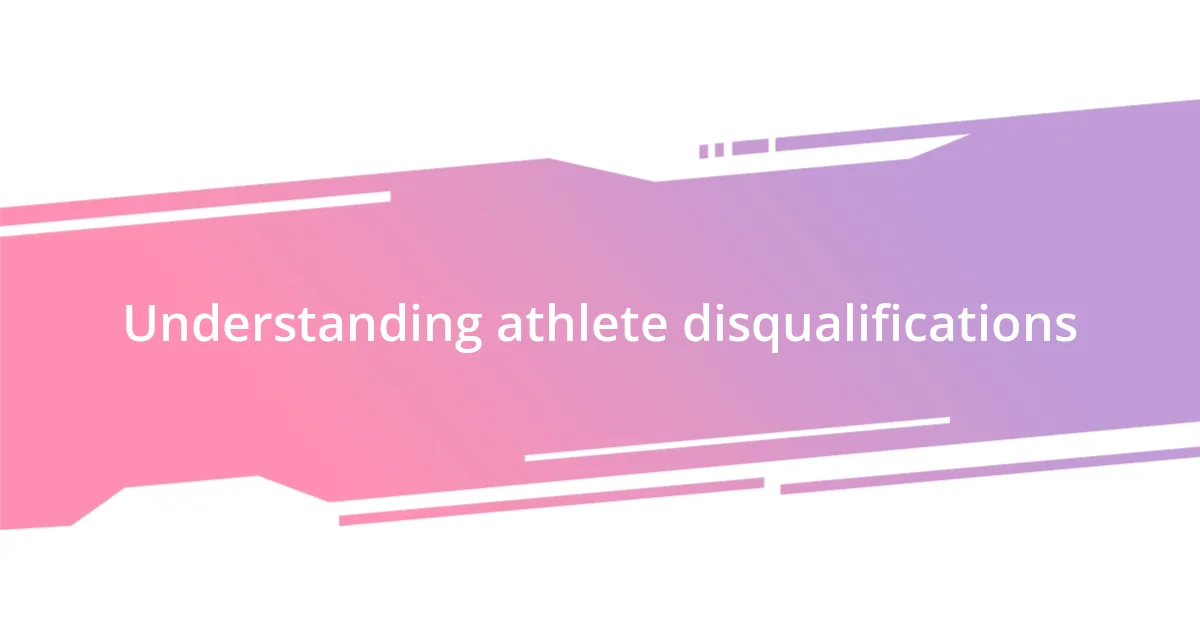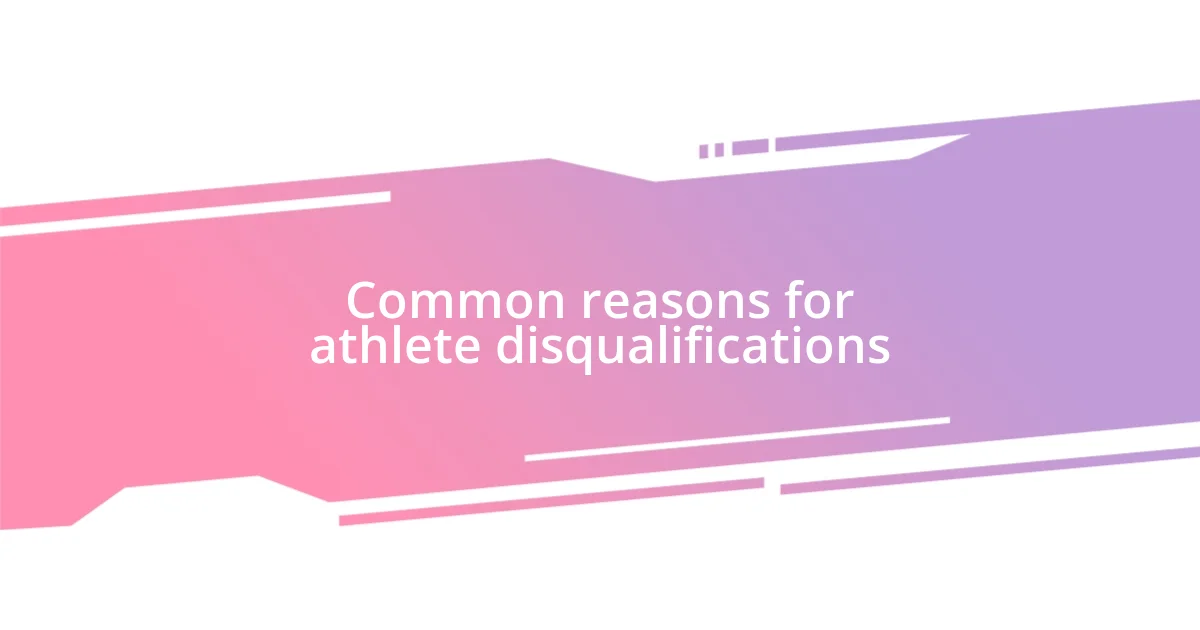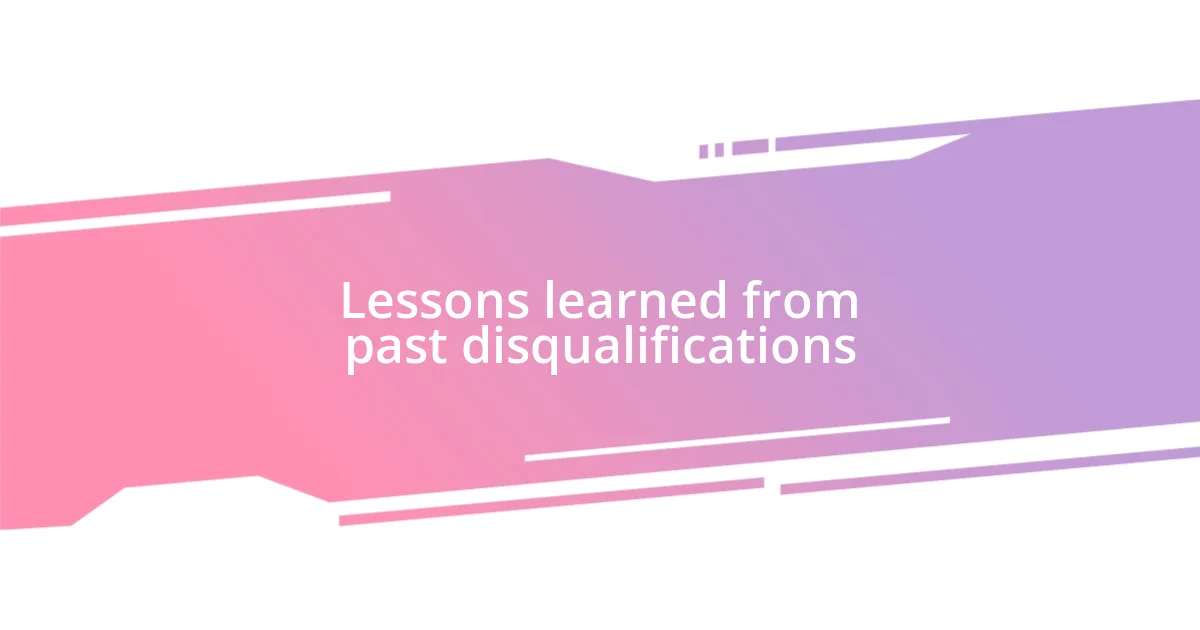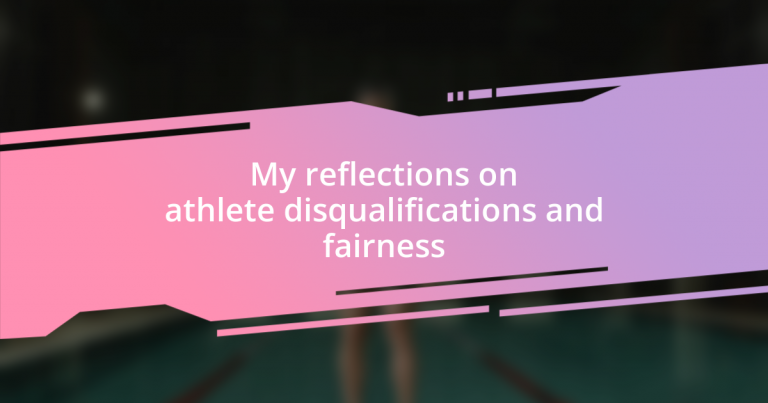Key takeaways:
- Athlete disqualifications arise from rule violations such as doping, unsportsmanlike conduct, and procedural errors, often impacting emotions and community support.
- The necessity for clearer rules and better communication is crucial to prevent unnecessary disqualifications and misunderstandings in sports.
- Empathy towards disqualified athletes and a collaborative approach can enhance fairness and foster a supportive environment in competitive settings.

Understanding athlete disqualifications
Athlete disqualifications often stem from violations of established rules, be it for doping, unsportsmanlike conduct, or procedural errors during competitions. I remember watching a race where a talented runner was disqualified for something as seemingly trivial as a false start. It’s heartbreaking to see someone’s hard work overshadowed by a few milliseconds; how fair is that in the grand scheme?
There’s an emotional layer to disqualifications that hard facts can’t fully capture. Take, for example, a moment I experienced at a regional championship. An athlete I admired was disqualified not just for a mistake, but because of a lack of clarity in the rules. I found myself wondering about the balance between strict adherence to regulations and the human element involved in sports. Is it really about fairness when the spirit of the game can be lost in the fine print?
Understanding these disqualifications requires more than just knowing the rules; it involves looking at the impact on the individuals involved. When a disqualification occurs, it’s not merely a loss for one, but an emotional blow that reverberates through an entire community of supporters and fellow athletes. Have you ever considered how a single decision can alter an athlete’s journey? It reminds us that behind every rule is a story deserving of empathy and consideration.

Common reasons for athlete disqualifications
Athlete disqualifications often arise from doping violations, wherein athletes use banned substances to enhance performance. I recall a time when a superstar swimmer I admired was disqualified after testing positive for a substance that they claimed was in an over-the-counter medication. It left me wondering about the complexities of intention versus the consequences in sports. This situation brings to light the moral and ethical debates surrounding fairness—how do we weigh an athlete’s knowledge of the substances they consume against the desire to compete at the highest level?
Unsportsmanlike conduct is another common reason for disqualification, and it can sometimes feel like the gray area of competition. I’ve seen athletes lose their tempers during intense matches, resulting in penalties that ultimately disqualify them. I remember a tense basketball game where a player was thrown out for taunting opponents. It’s a harsh reminder that emotions run high in sports, yet the rules exist to maintain a level of respect that is crucial for fairness and integrity. Do we sacrifice the competitive spirit for the sake of maintaining decorum?
Procedural errors also play a significant role in disqualifications, often as a result of misunderstandings or miscommunications regarding the rules. I once witnessed a young gymnast who completed a flawless routine but was disqualified due to an incorrectly filled-out scorecard. The disappointment on her face was palpable, and I couldn’t help but empathize with her frustration. It prompts the crucial question: should there be greater emphasis on education and clarity around competition procedures to avoid such disheartening instances?
| Reason for Disqualification | Example |
|---|---|
| Doping Violations | Use of banned substances |
| Unsportsmanlike Conduct | Taunting opponents during a match |
| Procedural Errors | Incorrect scorecard leading to disqualification |

Lessons learned from past disqualifications
Reflecting on past athlete disqualifications, I’ve come to appreciate the importance of clearer rules and communication. For instance, I remember an incident during a regional track meet where an athlete was disqualified due to a technicality involving their racing shoes. The confusion among spectators and competitors was palpable. It made me think: should rules be more user-friendly to prevent these unnecessary heartbreaks?
One of the most striking lessons I’ve gleaned is the need for empathy towards disqualified athletes. When I witnessed a passionate young football player receive a red card for what seemed like a minor infraction, I felt his anguish. His tears weren’t just about the game lost; they represented dreams shattered in an instant. This emotional turmoil leads me to ask—how often do we consider the human cost behind the strict enforcement of rules?
Moreover, I’ve learned that a collaborative approach can foster fairness. In my experience during a local swimming event, a group of athletes convened to discuss how minor infractions could be addressed without immediate disqualification. Their willingness to communicate not only alleviated tensions but also strengthened camaraderie. Isn’t it fascinating how cooperation can lead to better outcomes for everyone involved in the sport?














